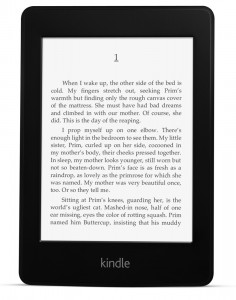 When Johannes Guttenberg invented the printing press he gave birth to the publishing industry. Later that day, a used bookstore opened. Before Guttenberg, books were copied by hand and copyright lawyers had an incredibly difficult time finding clients. While tedious, manual copying produced some benefits. Transcribers could act as editors. A 12th century “Fifty Shades of Gray” could’ve been shaped into a coherent story.
When Johannes Guttenberg invented the printing press he gave birth to the publishing industry. Later that day, a used bookstore opened. Before Guttenberg, books were copied by hand and copyright lawyers had an incredibly difficult time finding clients. While tedious, manual copying produced some benefits. Transcribers could act as editors. A 12th century “Fifty Shades of Gray” could’ve been shaped into a coherent story.
Media industries (film, television, music, video games, and publishing) have long rallied against used media. With the sale of used media, the content creators – the artists, developers, publishers – receive nothing. Large media corporations are always looking for a way to keep consumers from re-selling content. Anybody remember Flexplay? Automatically expiring DVD’s that would last for a few days, but would cost the same as regular DVD’s. Luckily the idea died before it could take hold. Macrovision, the encryption used on most VHS cassettes to prevent copying, didn’t play well with some TV’s and stereo systems, displaying a black or off-color screen every few seconds. They’re still around – as Rovi – encrypting DVD’s and blu-ray disks. Thankfully, TV’s have gotten smarter so we don’t have the old display problems. Then again, a dark frame every few seconds might improve the Twilight movies.
As profit margins shrink and publishing becomes more expensive, it stands to reason that publishers will be looking for ways to keep the bottom line in the black. What better way than to curb sales of used books?
The video game industry serves as a barometer for used content out of control. An average new game is $60. Within a few weeks, the price drops by $10 or $20. Retail outlets like GameStop are almost entirely focused on used sales, to the point where sales staff are encouraged to offer cheaper “near new” alternatives while offering to buy back used games. The arrangement is good for the consumer, but costs the developers a sale. Game development for big titles runs between 20-100 million dollars, and profit losses for used sales add up quickly. Developers and console manufacturers are desperate to stop used games from impacting their business, and have turned to a combination of digital download sales and packaged registration codes. These registration codes unlock content such as online multiplayer or extra levels. Once the code is used, it’s deader than Courtney Love’s career. For those who buy used titles, this means shelling out additional money to buy a new code to use content that should’ve been packed in with the game.
The publishing industry isn’t all that different. A new hardcover title retails for around $28. Wait a few weeks and you’ll find the used copy for half that on Amazon or at your local used book store. Discount outlets have long threatened book sales, but used books have a far greater impact. Imagine if publishers withheld the last chapter in a book, forcing readers of used books to buy that chapter back from the publisher.
Americans have long held to the doctrine of first sale. You buy something, it’s yours to do with as you please. Should you choose to rub peanut-butter between the pages of For Whom The Bell Tolls, that’s your call. Nobody’s going to stop you. If you choose to sell your used books, go right ahead. Digital content, however, has complicated everything. Kindle and Nook titles are tied to your account, and while you can switch between devices, you can’t resell a used digital book.
 Digital distribution isn’t the future, it’s the now. The true value in digital content rests in the doctrine of licensing. You’re not buying a copy of , you’re paying for the right to use it, read it, listen to it. Corporate control becomes far easier. Digital rights end up harming the customer. It’s not a complete loss; we have more outlets and faster delivery of content. I can start reading a new book seconds after the publishing date hits by downloading it to my Kindle or Nook or iPad. I just can’t re-sell it.
Digital distribution isn’t the future, it’s the now. The true value in digital content rests in the doctrine of licensing. You’re not buying a copy of , you’re paying for the right to use it, read it, listen to it. Corporate control becomes far easier. Digital rights end up harming the customer. It’s not a complete loss; we have more outlets and faster delivery of content. I can start reading a new book seconds after the publishing date hits by downloading it to my Kindle or Nook or iPad. I just can’t re-sell it.
While the next Playstation and XBox consoles haven’t been officially announced, the rumor mill is churning with theories. Chief among them is content protection. The Playstation 4 is rumored to have RFID tags on disks that lock games to consoles. Used games simply won’t work. The next XBox is rumored to install all games and lock them to the console. You buy a game, install it, and the disk is dead. If these rumors are true, game publishers and console manufacturers stand to see a huge boost in long-term sales while the used game industry will collapse. Putting more money into developer hands isn’t necessarily a bad thing, but what about the end user? Used game sales help drive down the price of new titles. What incentive do developers have to drop the price if there’s no used market to compete with?
If Sony and Microsoft move forward with their plans, other content industries could follow. Movies and TV are streaming more frequently and physical disks are becoming a rarity. With digital content, we’re trading flexibility for convenience. While Amazon is experimenting with shared content – library book rentals and trading between kindle readers, and the much rumored Used Kindle store may even come to life this year – the publishing industry may have a few things to say about that.
As a consumer, I want to be able to sell books that suck and movies I no longer watch. As an author, I’d like to get paid when my stories are enjoyed. We live in a capitalist world. If nobody pays the artist, nobody creates art. There has to be parity somewhere. I’m just not sure I want Redmond and Tokyo deciding for me.